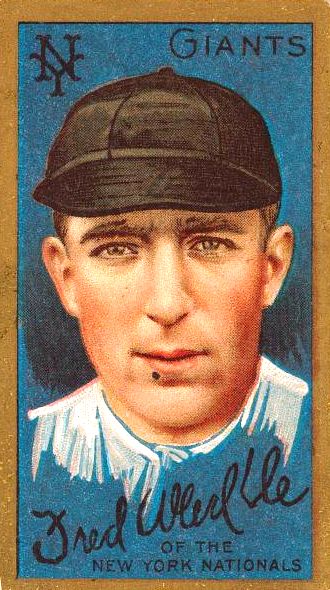SABR celebrates 100th anniversary of the Fred Merkle Game in 1908
Editor’s note: On September 23, 2008, SABR’s Deadball Era Committee commemorated the 100th anniversary of the “Merkle Game” by publishing a special centennial edition of “The Inside Game” newsletter focused entirely on the infamous incident that changed the fortunes of the 1908 National League pennant race. Click here to download the Deadball Era Committee’s Merkle Game newsletter (PDF) and read articles on all aspects of the Merkle Game, written by SABR members Keith Olbermann, Norman Macht, Peter Morris, David Nemec, Cindy Thomson, Craig Lammers, Molly Lawless, David Stalker, Brian Englehardt, David Shiner, and Mark Fimoff.
By John McMurray
September 23, 2008
 One hundred years later, the allure of the Merkle Game endures. Not only did Fred Merkle’s failure to touch second base during a game between the New York Giants and Chicago Cubs have a direct effect on the storied 1908 pennant race, but it also launched decades of debate that will never be resolved definitely. It was the ultimate remarkable game of a remarkable sporting era, where major league baseball as an established institution was still finding its way.
One hundred years later, the allure of the Merkle Game endures. Not only did Fred Merkle’s failure to touch second base during a game between the New York Giants and Chicago Cubs have a direct effect on the storied 1908 pennant race, but it also launched decades of debate that will never be resolved definitely. It was the ultimate remarkable game of a remarkable sporting era, where major league baseball as an established institution was still finding its way.
There are many baseball incidents that may be considered the most memorable game or play in baseball history. Yet in most other cases—whether it is Bobby Thomson’s “Shot Heard ’Round the World” in 1951 or the ball rolling through Bill Buckner’s legs in Game 6 of the 1986 World Series—we know exactly what happened. That is not so here. Even people who were at the game in 1908 disagreed about what really happened decades later. Unlike most sporting achievements, the Merkle game has more to do with cerebral baseball than it does with athletic achievement. The incident will live forever in part because no one will ever really know the whole story. The Merkle game retains its romance from afar.
If the Merkle game were played in the modern era, it would not have the same luster. Through replay, fans would know definitely how Johnny Evers got the ball that he held when he touched second base to force Merkle out. Viewers would be able to confirm whether or not Giants’ pitcher Joe McGinnity really intercepted the original ball and threw it into the stands before the forceout was completed. As Cait Murphy noted in Crazy ’08, Christy Mathewson even claimed that he saw Merkle touch second base, while another newspaper account noted that some Cubs’ fans physically restrained Merkle from completing the play.
A modern-day episode would be replete with confirming television and newspaper accounts, which were unavailable then. More practically, the game never would have been called on account of darkness today, and the crowd never would have been allowed to swarm the field. Still, the factors that came together on September 23, 1908 made for a unique baseball event that will never be duplicated.
The chaos surrounding the umpires in Merkle game only added to the drama. Facing a hostile crowd, umpire Hank O’Day made the unpopular call amidst the throng of fans. Of course, Johnny Evers was also especially savvy in forcing the issue. Evers’ persistence was emblematic of an era where ballplayers were relied upon for their on-field savvy. Further, the subsequent debate in the days that followed about whether the game needed to be re-played brought together many of the quintessential Deadball Era figures, from John T. Brush to Harry G. Pulliam. With the relatively young game still getting its footing in the new century, baseball’s leadership had to go back to first principles to decide how to deal with this issue, all in the thick of the pennant race.
Merkle, of course, deserved better. He was well-known to be a savvy player who excelled at bridge. Merkle remained a quietly capable performer for 14 more seasons after the incident and was a vital part of the Giants’ pennant winning teams from 1911 through 1913. One of the great ironies of the incident is that Merkle was consistently among the team’s leaders in stolen bases throughout his New York career; Merkle certainly had the speed to make it to second base safely had he chosen to do so. Yet his redeeming qualities are often lost to history, as the incident followed him for the rest of his life. In a sad twist of fate, Merkle appeared in five World Series after the 1908 incident and played on the losing side each time. Even while coaching with the New York Yankees in the 1926 World Series, unlucky Fred Merkle’s team came up short of a World Championship.
It seems safe to assume that if baseball is still being played one hundred years from now, fans and scholars will recall the Merkle game with similar vigor. It is impossible to tell the story of the great 1908 season without it, and it can justifiably lay claim to being the most memorable baseball game ever played.
- Read more: Click here to download the Deadball Era Committee’s Merkle Game newsletter published on September 23, 2008 (PDF)
JOHN McMURRAY is the chairman of SABR’s Deadball Era Research Committee. He can be reached at deadball@sabr.org. To read more from “The Inside Game” newsletters, click here.

